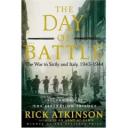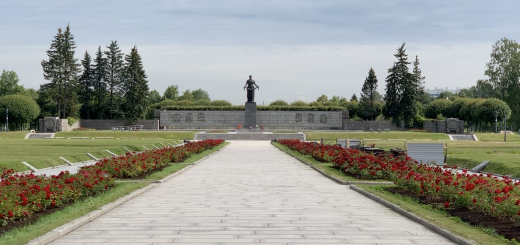bookrev: The Day of Battle: The War in Sicily and Italy, 1943-1944 by Rick Atkinson
Volume Two of the Liberation Trilogy (from the invasion of Sicily in July 1943 to the fall of Rome just before D-Day, June 1944) (review of Advanced Reader Copy)
Another triumphant book from the Pulitzer prize winning author
The Day of Battle is an excellent follow-up to An Army At Dawn, covering the often overlooked, extremely bloody and costly campaign in Italy. Again Mr. Atkinson uses a variety of sources to turn history into a smooth flowing story, including viewpoints from generals and soldiers alike.
Several topics stand out in Mr. Atkinson’s writing:
- I am struck by the contrasts in war reporting today versus WWII. Today information is instantaneous, and we are constantly and instantly informed of attacks in Iraq, how many Americans have been killed, and if it was an attack or an Armed Services mistake or negligence. All of this information was managed in WWII, but the mistakes, failed or bad planning, lack of cross-services coordination, etc. were even more severe. The feeling through history was that the Allied Army freeing Europe was a well-oiled machine; in retrospect, while brave and persistent, many were killed due to poor planning and coordination that could have been prevented. Granted, hindsight is 20/20, and it makes me wonder what future generations will wonder looking back on the war in Iraq (this curiosity has moved me to put Mr. Atkinson’s In the Company of Soldiers where he spent time in Iraq on my reading list);
- No matter how romantic and invincible the soldiers of WWII seem from afar, they realized the terror and inhumanity of war, even as they became good at it;
- Many historians have debated whether the Allied invasion of Italy was effective or useful or most importantly worth the price in lives. Mr. Atkinson lays out the story based on facts and research, including a epilogue that takes on this question:
Moreover, all criticism of the Italian strategy butts against an inconvenient riposte: if not Italy, where? “Events generate their own momentum, impose their own force, and exert their own influence on the will of man,” wrote Martin Blumenson, who spent a professional lifetime pondering the Mediterranean campaign. “We went into Sicily and Italy because we had been in North Africa.” No oceangoing fleet was available to move a half a million men from the African littoral to England, or anywhere else; nor could British ports, rails and other facilities, already overwhelmed by the American hordes staging for OVERLORD, have handled such a force.
As with his first volume, this one is split into four parts sandwiched by a prologue and epilogue.
Part 1: Invasion of Sicily; excellent descriptions of Patton and Montgomery’s personalities as the race to Messina, where the Allies allowed many Axis troops to easily escape across the inlet; includes notes on Patton’s infamous berating of two soldiers in hospitals because of nerves, and the reaction of Eisenhower that put Patton on the sidelines until the invasion at Normandy;
Part 2: Invasion of Italy (Salerno), surrender of Italian government, the winter slogging through the mountainous Italian peninsular;
Part 3: Stall in the mountains, Anzio, Cassino; perhaps the bloodiest campaign of the entire world war. Mr. Atkinson provides excellent depictions of the battles, plus statistics and analysis on what went right/wrong:
To cross that seven-mile stretch and pierce the Bernhardt Line had taken the Fifth Army six weeks, at a cost of sixteen thousand casualties.
More than sixty years after the Allied perdition at Anzio, Lucas’s caution seems sensible and even inevitable, given Clark’s wooly instructions and Alexander’s hail-fellow approbation.Those who most closely scrutinize the VI Corps predicament tended to concur that a pell-mell lunge for the Colli Laziali would have been reckless.
Part 4: Operation DIADEM and the drive for Rome; finally, despite bloody stalls and near defeats at Cassino and other lesser known battles, American productivity and numbers finally help the Allies overwhelm the Germans:
“Total war” was largely a German concept, conceived by General Erich Ludenhoff as an alternative to the grinding stalemate of World War I. But the Americans had made it their own, stamping it with a Yankee efficiency and management genius that outproduced the Axis fourfold in heavy guns, fivefold in bombers and sevenfold in transport planes.
Also, I enjoyed the maps which should be a big part of any history novel, and I notice they are consistent with Mr. Atkinson’s other books.
After reading both of the first two volumes in quick order, I now have to wait potentially two years for the third. I hope Mr. Atkinson hurries, and then turns his writing and research to the WWII Pacific theater in the same manner, or World War I.






Heh…if you only have to wait two years count yourself lucky. I read the first book right when it was released. Now it’s been over four years that I’ve waited. I think it will be well worth it though. Thanks for the review.
Pat, in the mean time, I’ll read Mr. Atkinson’s In the Company of Soldiers….very slowly!
I was actually disappointed by Atkinson’s first volume which, as far as histories of WWII go, was done better at other hands. I am glad to hear vol. 2 is better.
Andrew, I quite enjoyed the first one and well as the second, and would put it in company with Cornelius Ryan and John Keegan’s tomes. Each of the three of them have different writing styles and perspectives that come at it from a different historical experience perspective (Keegan WWI, Ryan WWI and Atkinson the modern era).
I have reviews of both posted here, and will be starting In the Company of Soldiers soon.
In my research, I found Naples, Italy to be about the worst city to live in during WWII. Nearly 5 years of bombings, first the Allies then the Luftwaffe, no food, no sanitation, a Nazi retreat that attempted to take down every building in the city except historical structures.
Don, by an interesting coincidence, I’ve been reading a book called “Gomorrah” concerning the Italian organized crime groups in and around Naples. Certainly seems like Naples has suffered multiple woes since the WWII bombings.
This book is full of details, comments and observations making it vivid, interesting and factual. However, one must lay the book down from time to time in order to summarize the actions.